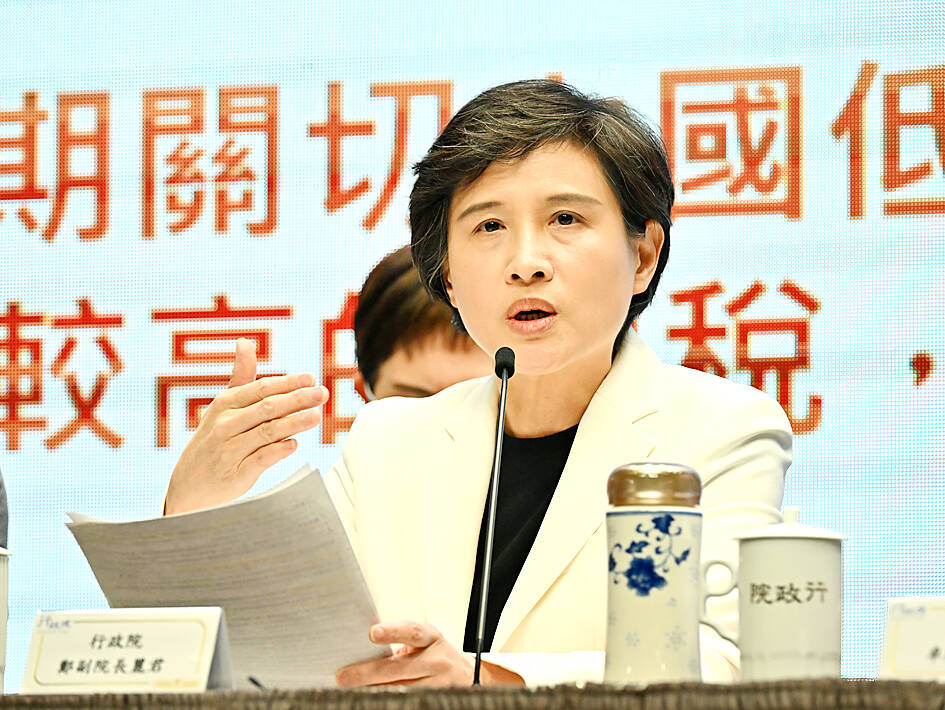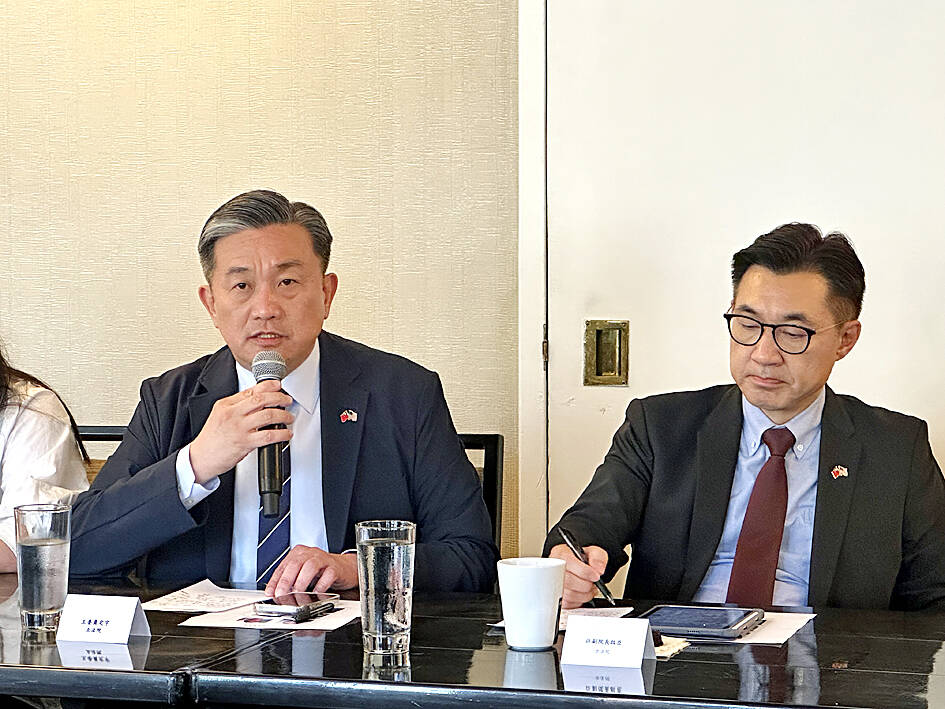Taiwan and the US have concluded their first in-person meeting on tariffs, the Office of Trade Negotiations said yesterday. A delegation led by Vice Premier Cheng Li-chiun (鄭麗君) and top trade negotiator Yang Jen-ni (楊珍妮) held talks in Washington with US officials on tariffs, non-tariff barriers and other bilateral trade issues.
The meeting was harmonious and friendly, and both sides agreed to strengthen economic cooperation to promote mutual benefits and create more business opportunities, the office said.
The meeting followed an initial round of talks held via videoconference on April 11.

Photo: Tien Yu-hua, Taipei Times
US President Donald Trump first announced sweeping “reciprocal” tariffs on April 2, including a 32 percent import duty on goods from Taiwan. A week later, he announced a 90-day pause to allow negotiations for a lower rate.
In the statement, Cheng said Taiwan and the US have highly complementary economies and that close cooperation between the two sides could strengthen their industries and enhance their global competitiveness.
Cheng said she believed that through thorough discussions, Taiwan and the US could reach a consensus on trade issues.

Photo: CNA
Meanwhile, Democratic Progressive Party (DPP) Legislator Wang Ting-yu (王定宇), who was part of a delegation of lawmakers visiting Washington, said Taiwan is among the first four countries that the US is to negotiate with on tariffs. The other three are Japan, South Korea and Vietnam.
Wang said US officials assured him that Taiwan would not be used as an object of negotiation with other countries and that “Taiwan is irreplaceable.”
The two sides also talked about issues such as China’s “gray zone” tactics and US-Taiwan arms sales, he said.
US officials also explained why they shifted their focus to the Indo-Pacific region, he added.
Deputy Legislative Speaker Johnny Chiang (江啟臣) of the Chinese Nationalist Party (KMT), who led the delegation, said that they expressed the concerns of Taiwanese industries and that losses might be incurred by both sides due to trade uncertainty.
He said he also expressed to US officials hopes that arms purchases could be counted as trade between Taiwan and the US, which can help with the trade balance.
Investments and purchases between the two sides are not merely trade numbers, he said, adding that US officials also discussed their relationship in terms of safety and politics, as well as Taiwan’s significance in technology, semiconductors and security.
“[They] will not just regard Taiwan-US ties in terms of trade or Taiwan’s handling of tariff policies,” he said.
DPP Legislator Chiu Yi-ying (邱議瑩) said Washington was worried whether Taiwan had enough funds to buy more US weapons, expressing hope that the legislature could revisit its budget freezes and cuts.
Chiang said the legislature needs to approve special and defense budgets, and that those budgets must be used in the most advantageous way.
The delegation, which also included KMT lawmakers Chang Chih-lun (張智倫) and Huang Chien-hao (黃健豪), Taiwan People’s Party Legislator Lin Yi-chun (林憶君) and DPP Legislator Ngalim Tiunn (張雅琳), ended its visit on Friday.
They visited the US Department of Commerce, intelligence, foreign affairs and armed services committees of the US Congress, the US-Taiwan Business Council, the Heritage Foundation, Meta, former speaker of the US House of Representatives Nancy Pelosi and former American Institute in Taiwan chair Laura Rosenberger.

The Taiwanese passport ranked 33rd in a global listing of passports by convenience this month, rising three places from last month’s ranking, but matching its position in January last year. The Henley Passport Index, an international ranking of passports by the number of designations its holder can travel to without a visa, showed that the Taiwan passport enables holders to travel to 139 countries and territories without a visa. Singapore’s passport was ranked the most powerful with visa-free access to 192 destinations out of 227, according to the index published on Tuesday by UK-based migration investment consultancy firm Henley and Partners. Japan’s and

NATIONAL SECURITY THREAT: An official said that Guan Guan’s comments had gone beyond the threshold of free speech, as she advocated for the destruction of the ROC China-born media influencer Guan Guan’s (關關) residency permit has been revoked for repeatedly posting pro-China content that threatens national security, the National Immigration Agency said yesterday. Guan Guan has said many controversial things in her videos posted to Douyin (抖音), including “the red flag will soon be painted all over Taiwan” and “Taiwan is an inseparable part of China,” while expressing hope for expedited “reunification.” The agency received multiple reports alleging that Guan Guan had advocated for armed reunification last year. After investigating, the agency last month issued a notice requiring her to appear and account for her actions. Guan Guan appeared as required,

Japan and the Philippines yesterday signed a defense pact that would allow the tax-free provision of ammunition, fuel, food and other necessities when their forces stage joint training to boost deterrence against China’s growing aggression in the region and to bolster their preparation for natural disasters. Japan has faced increasing political, trade and security tensions with China, which was angered by Japanese Prime Minister Sanae Takaichi’s remark that a Chinese attack on Taiwan would be a survival-threatening situation for Japan, triggering a military response. Japan and the Philippines have also had separate territorial conflicts with Beijing in the East and South China

A strong cold air mass is expected to arrive tonight, bringing a change in weather and a drop in temperature, the Central Weather Administration (CWA) said. The coldest time would be early on Thursday morning, with temperatures in some areas dipping as low as 8°C, it said. Daytime highs yesterday were 22°C to 24°C in northern and eastern Taiwan, and about 25°C to 28°C in the central and southern regions, it said. However, nighttime lows would dip to about 15°C to 16°C in central and northern Taiwan as well as the northeast, and 17°C to 19°C elsewhere, it said. Tropical Storm Nokaen, currently